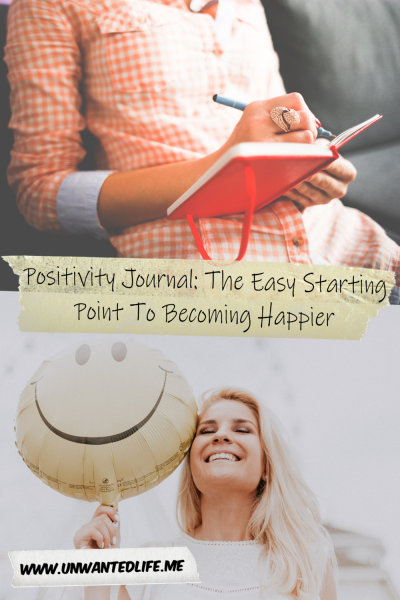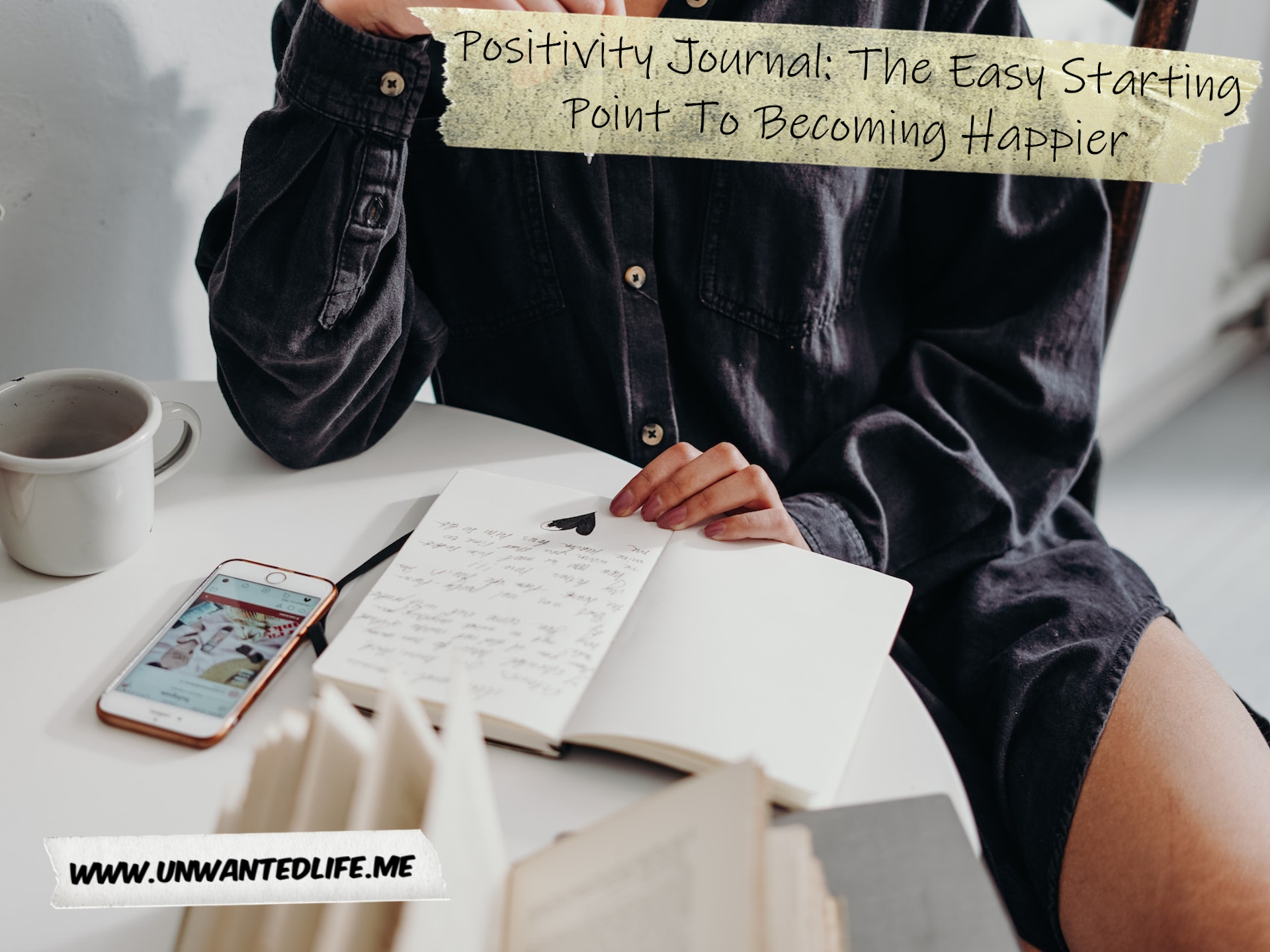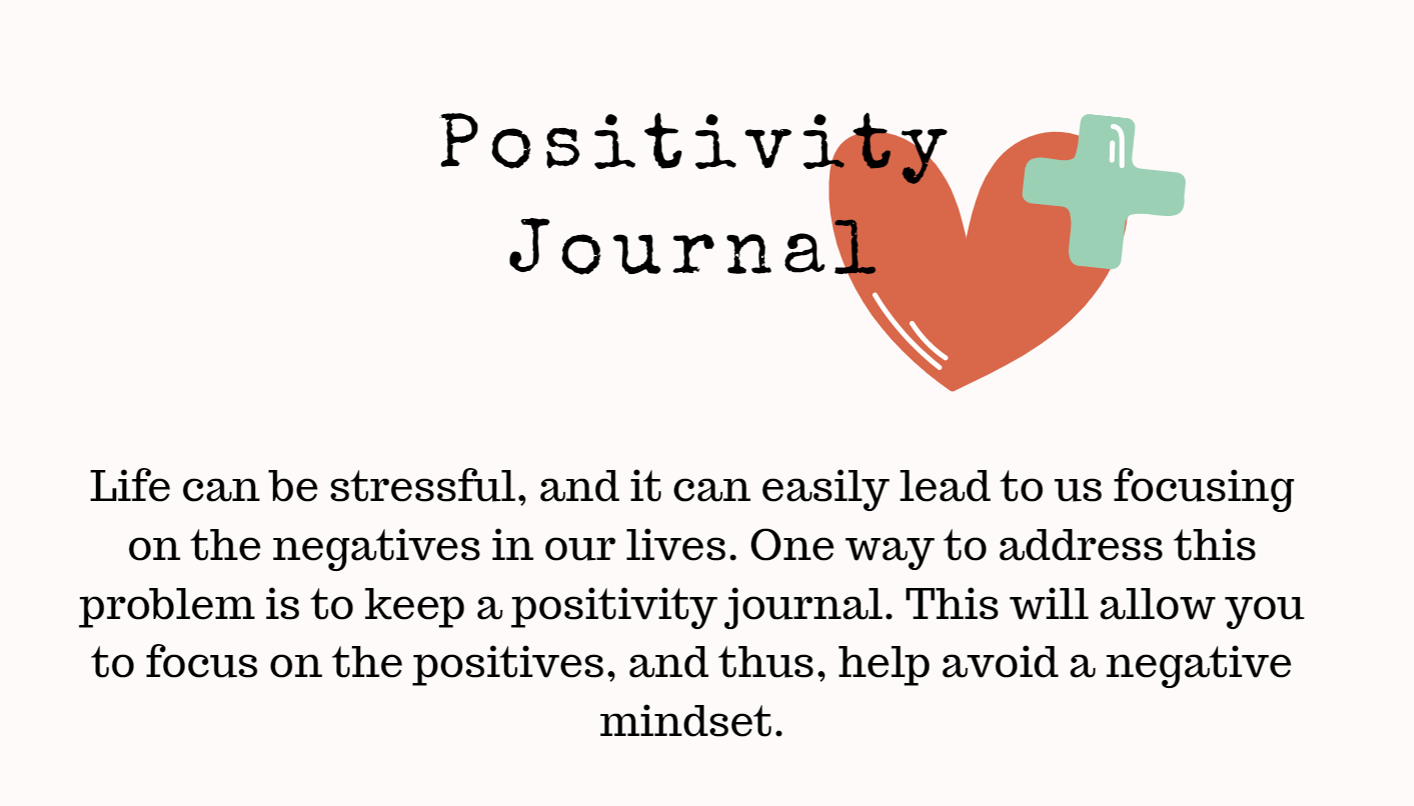Recently, I’ve been adopting more of a positive psychology approach to my clients, as recently there’s been an increase in people feeling down. A great way to start changing that is by using a positivity journal. Thus, I created a positivity journal for people to complete and this article to go with it. Enjoy.
Disclosure: This article contains links to my Unwanted Life Shop. Read my full disclosure here.
What Is Positivity?
I know I probably don’t need to define this, but given that this is the basis of the article, I feel like I should, anyway. Unfortunately, dictionaries like Merriam-Webster use the word positive to define positivity, which is kind of lazy, if you ask me. Fortunately, The Berkeley Well-Being Institute had something a little more up to the task. They defined positivity as the practice or tendency to be optimistic in life, or positive.
Basically, positivity is composed of being positive, acting positive, positive thinking, positive emotions, and engaging in positive behaviours. This sounds intense when you put it like that. So let’s stick with the tendency to be optimistic and positive.
What Is A Positivity Journal?
Journaling is a long-held self-care intervention within the field of therapy that can be recommended to help with a wide range of issues or simple data collection. So what’s a positivity journal then? It’s an intervention taken from positive psychology that can help you tap into a positive mindset, using a similar setup to traditional journaling.
How Can A Positivity Journal Help Me Become Happier?
Life is hard for most people. There’s no getting around that, and because it’s hard, our brains can develop thinking errors, or cognitive biases as it’s also referred to. These thinking errors can cause us to focus on the wrong aspects of life, the aspects that bring us down: life’s negatives.
For example, there’s a thinking error called ‘focusing on the negatives’. This is where our mind filters out the positives to focus on the negatives. As the name of this error suggests. It’s an easy thinking error to develop because it’s so easy to doomscroll. What keeping a positivity journal does it help to readdress that bias. In doing so, you can increase your chances of being happier.
Because keeping a positivity journal can help bring you back from a negative mindset, it can be useful in tackling conditions like depression. Depression can be stubborn to shift, and in some cases, might require antidepressants to restore a person’s quality of life.
In fact, one way to test how stubborn your depression might be is to try keeping a positivity journal. That’s because there are three symptoms of depression that can be problematic to overcome.
- Anhedonia (an inability to enjoy pleasurable things that would usually cause you pleasure).
- Anergia (unusually low level of energy).
- Concentration (lacking in motivation).

Interventions like keeping a positivity journal can help challenge these three symptoms of depression, and if they can be overcome with interventions like this, then great. However, when they remain, this likely means a conversation needs to be had with your GP to start on antidepressants and/or talking therapy. Therefore, in therapy, suggesting a positivity journal as homework is a good way to find out just how bad a person’s depression is. Thus, it can also be a good way for you to find out how bad your depression is as well.
Furthermore, by actively seeking out the positivity in your life and the world around you, the happier you’re likely to be (Catalino, Algoe, and Fredrickson, 2014). In short, the pursuit of happiness starts with looking for the positives. Because happiness isn’t a choice, it’s something you have to work at. However, it’s important to remember that you can’t be happy all the time, and trying to do so will lead to failure.
Developing a positive mindset, by starting with the simple intervention of keeping a positivity journal, can have a positive impact on both your mental wellbeing and health (Verywell Mind). This is because it’s easier to manage stress when you’re not fixated on the worst outcomes. Even if you do have a positive mindset, you still have to get through life and the stresses that come with it. It’s just a little easier to handle the reality of life.
What’s great about adjusting to a more positive mindset is that it doesn’t just benefit you. When parents engage in more positive interactions with their children, their children tend to have better mental health outcomes (Foster et al., 2022). But it doesn’t just spread positivity within the child/parent dynamic. Just think along the lines of, “Laughter is contagious”.
Positivity Journal
My positivity journal comes with three steps to follow to help you develop a more positive and optimistic outlook on life. It’s designed to be followed over several weeks, so it builds up in scale, with the hopes it’ll help you enjoy life a little more.
You can buy my positivity journal through my shop by clicking here.
Summary
It’s all about developing a positive mindset. If you can do that, it’s easier to experience happiness and live a better quality of life. The positivity journal that you can buy from my shop is the stepping stone to make that happen. Keep your eyes open for future articles on how to further develop your positive mindset.
As always, leave your feedback in the comments section below. Also, please share your experiences with using a positivity journal and developing a positive mindset in the comments section below as well. Don’t forget, if you want to stay up-to-date with my blog, then sign up for my newsletter below. Alternatively, get push notifications for new articles by clicking the red bell icon in the bottom right corner.
Lastly, if you’d like to support my blog, you can make a donation of any size below. Until next time, Unwanted Life readers.
References
Catalino, L. I., Algoe, S. B., & Fredrickson, B. L. (2014). Prioritizing positivity: An effective approach to pursuing happiness?. Emotion, 14(6), 1155. Retrieved from https://www.ncbi.nlm.nih.gov/pmc/articles/PMC5533095 and https://psycnet.apa.org/record/2014-48826-003.
Foster, D., Rodrigues, M., Somir, I., Aziz, T., Patel, R., Ragunathan, S., Sokolovic, N., & Jenkins, J. (2022). Paternal positivity and child mental health: A meta-analysis. Journal of Child and Family Studies, 31(9), 2556-2570. Retrieved from https://www.researchgate.net/profile/Daniel-Foster-14/publication/362428333_Paternal_Positivity_and_Child_Mental_Health_A_Meta-Analysis/links/6332123f86b22d3db4e552d3/Paternal-Positivity-and-Child-Mental-Health-A-Meta-Analysis.pdf and https://link.springer.com/article/10.1007/s10826-022-02361-7.



I love positive journaling. And I’m doing it now. It does help and make me happier. Journaling is the best way to motivate myself.
Thanks for commenting
This is a very eye opening post. I have a feeling I need a positivity journal, especially these days. Thank you for sharing.
I hope you give positivity journaling a try. Thanks for commenting
I totally agree, having the positive journal does help because I used it as well but once I got very busy, couldn’t keep it going.
It’s during those busy times where we find we might benefit the most from keeping a positivity journal
Love the idea of a positivity journal. Gratitude is one of the most powerful things that turned my life around.
Thanks for commenting
A positivity journal sounds great. I try to practice gratitude and you made some very valid points. Informative as per usual. I have some family members that struggle with depression and this sounds like a great suggestion.
It can be a simple exercise that can either help show that change is possible or identify if more professional help will be needed. Thanks for commenting
Journaling has been a great help to me in dealing with depression. I have a gratitude journal that I write in in the mornings, it gives me a positive start to the day.
A gratitude journal is something I also plan to write about at some point. Thanks for sharing
Thanks for sharing your thoughts on positivity and the practise of journaling. Completely resonate with what you are saying here, and that over time, we develop negative bias. A positive journal ensures that we reflect and remember on positive things that happen in our life. I know how helpful it has been for me, and there is so much research that backs this up. Thanks so much for sharing, this is going to be so helpful for me, and many others! x
Thanks for commenting
I would definitely love to try out the positivity journal! If you can share with me how I can get access to it that would be great!
Are the links in the article that will take you to it not working?
Changing mindset to a positive one makes a huge difference. I am not a big fan of therapy but have seen an alcoholic friend turn themselves around through actively forcing themselves to be more positive. I force myself to think positive even though I know there are lots of negatives out there.
The world seems like it’s set up to magnify the negatives, which is why it’s so important to make sure you don’t overlook the positives. Developing a positive mindset doesn’t mean pretending the negatives don’t exist, but that there’s more to life than focusing on those negatives. I hope your friend with substance dependency finds a way to reach their recovery goal and maintain it
Great post as usual but your link to your shop isn’t working?
Thanks for letting me know. I don’t know why WooCommerce sometimes does that, but it appears to be working as it should now
My journals can be SO negative. I definitely need prompts to help me thing of happier things to write about. Future me will think I was clinically depressed today!
I hope this article serves as a prompt to add some positivity to your journaling habit